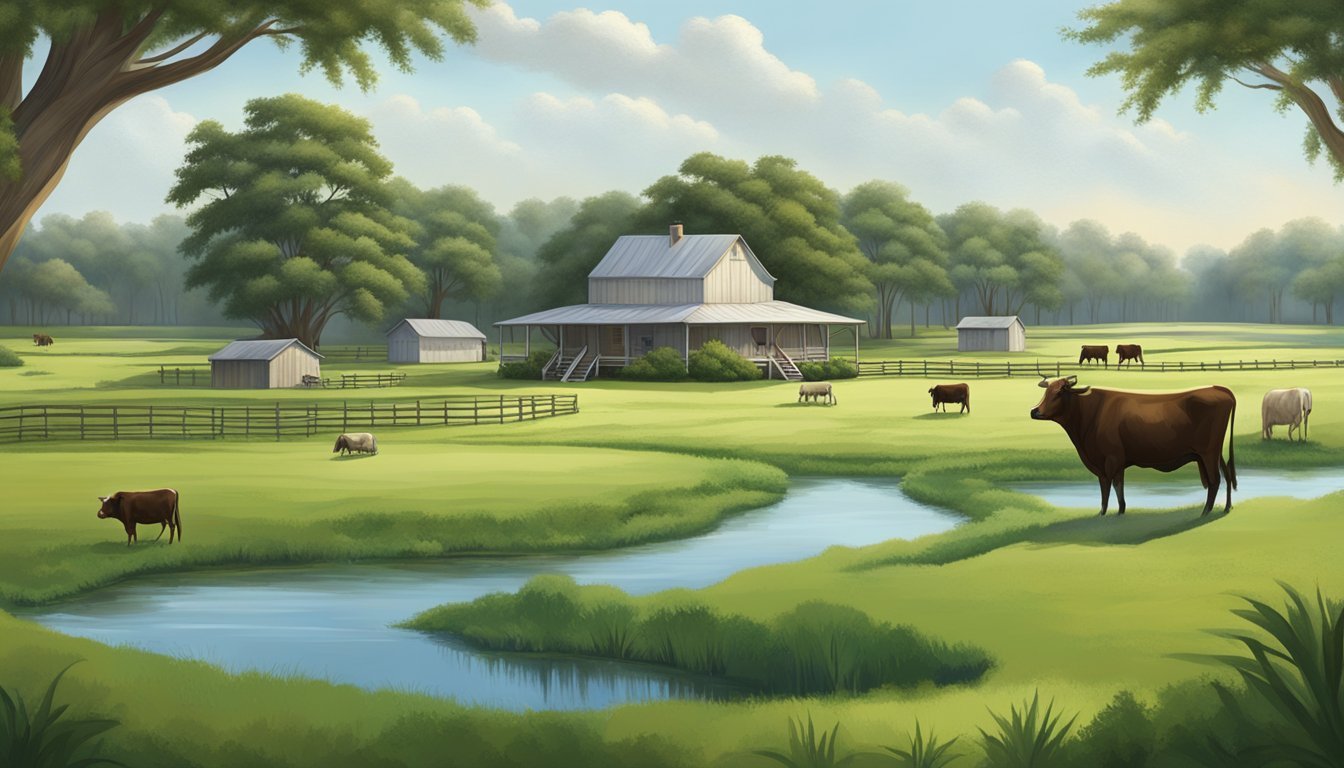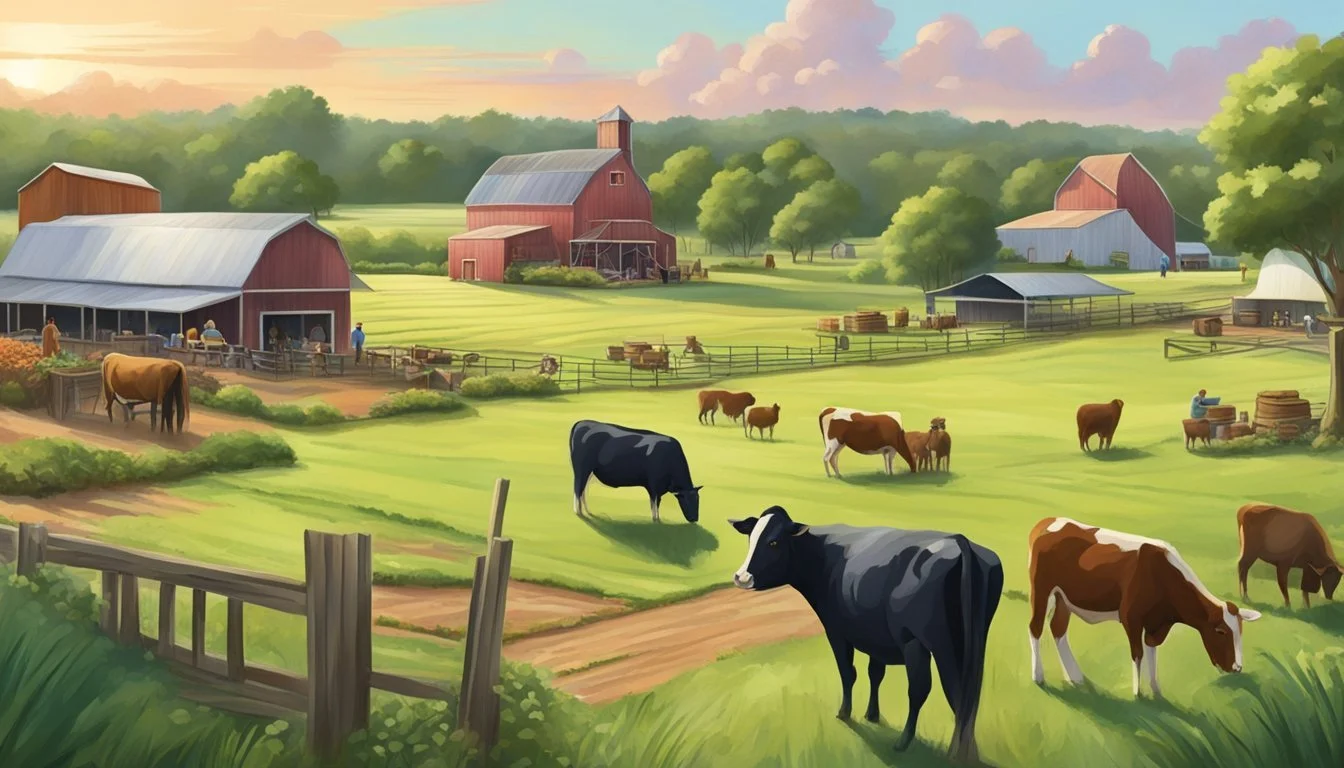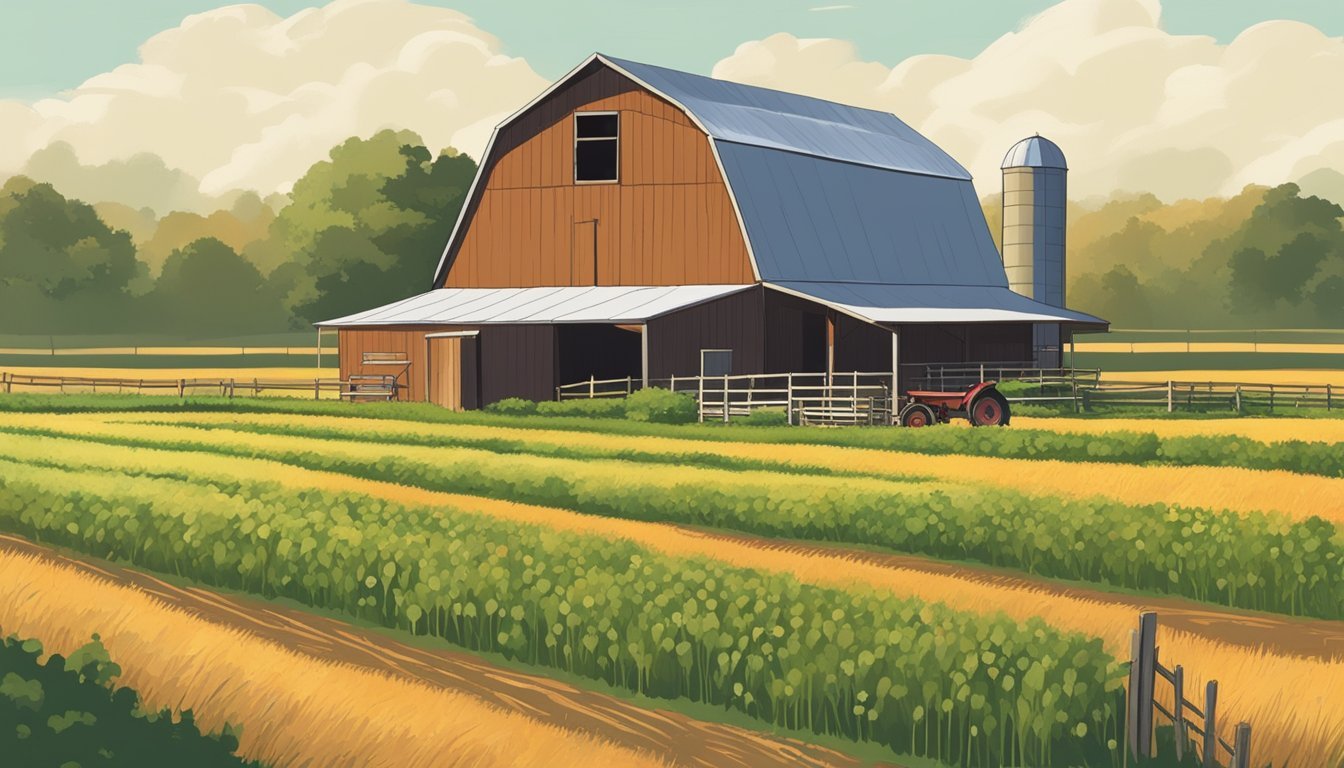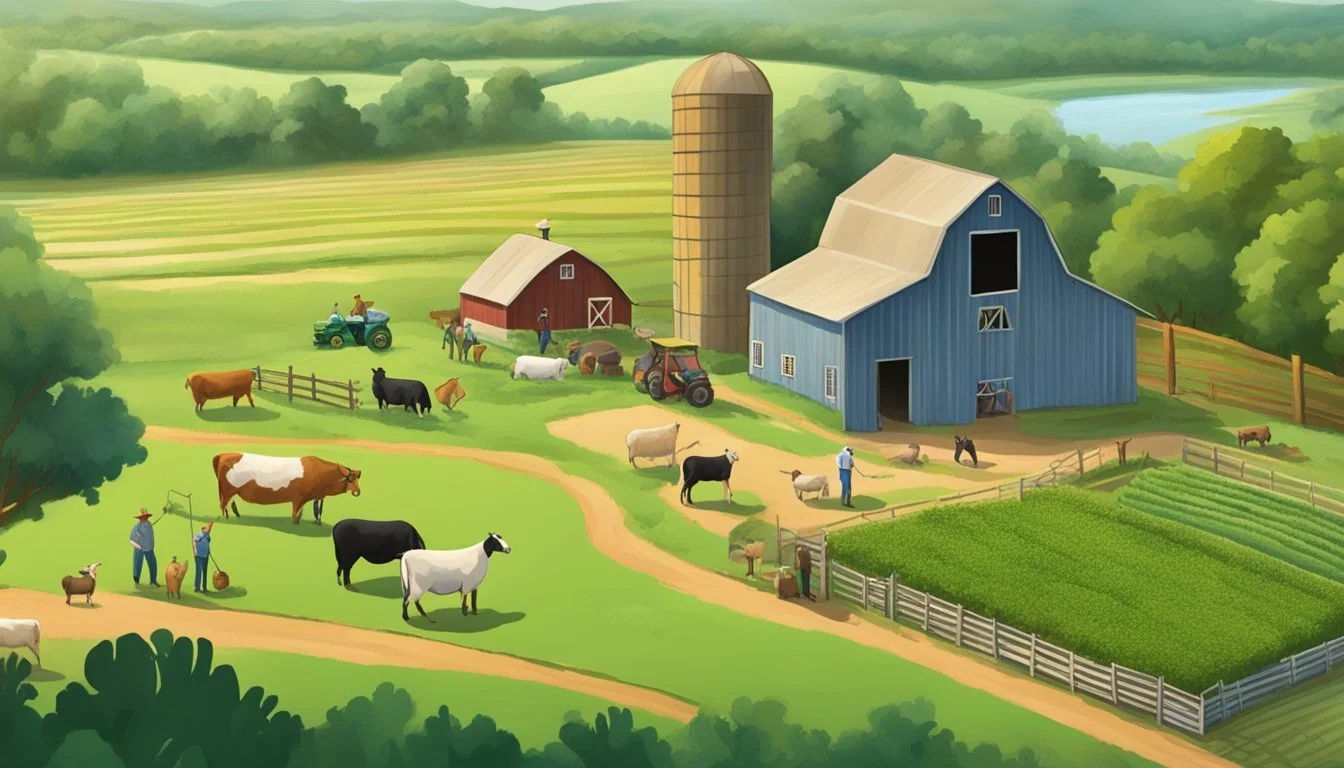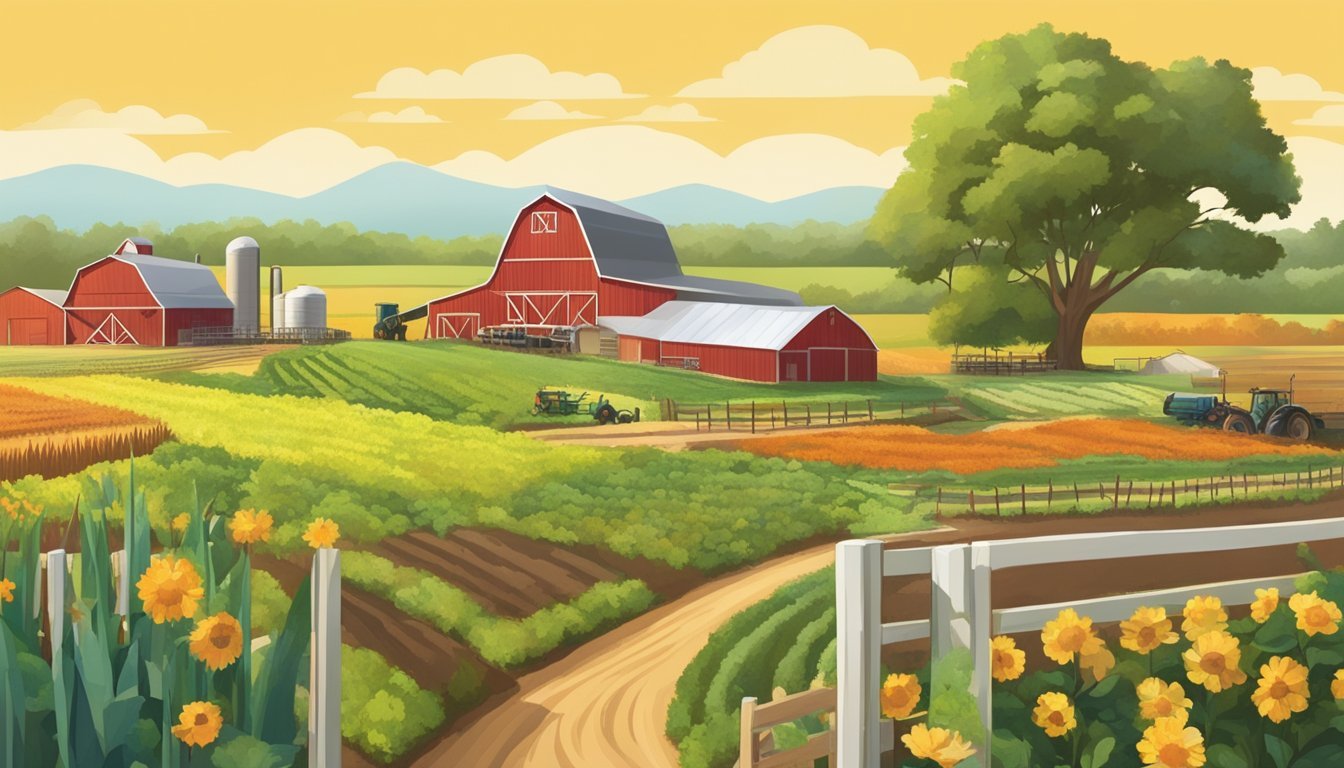Agritourism in Louisiana
Embracing the Rich Agricultural Heritage
Agritourism in Louisiana merges the state's rich agricultural heritage with the growing interest in authentic travel experiences. By opening their doors to visitors, farms, ranches, and agricultural enterprises across Louisiana provide educational and immersive activities that allow individuals to connect with the origins of their food and explore rural life. This fusion of agriculture and tourism not only serves as a method for farmers to generate supplemental income but also meets the demand among consumers for sustainable and educational travel opportunities.
Louisiana's diverse agritourism offerings range from crawfish farm tours to fresh produce markets, imbuing travelers with a deeper appreciation for the state's land and water resources. With agriculture at the heart of Louisiana's economy and cultural history, agritourism becomes an avenue to celebrate and preserve this integral aspect. Visitors to these agritourism venues partake in a variety of experiences such as picking fresh fruits and vegetables, learning about farm operations, and enjoying the natural beauty of the Louisiana countryside.
These experiences are crafted not only to entertain but also to educate the public on agricultural processes and the challenges of food production. Agritourism in Louisiana is marked by its potential for growth and for strengthening the connection between consumers and the many elements that comprise the state's agricultural industry. Through these interactions, farmers and consumers alike gain valuable insights, fostering a community that values local produce, sustainable practices, and the culinary traditions rooted deeply in Louisiana's soil.
Overview of Agritourism
Agritourism in Louisiana intertwines education, entertainment, and tourism into unique agricultural experiences. It contributes to the state's economy while preserving its rich farming traditions.
Defining Agritourism
Agritourism is the practice of making a working farm, ranch, or other agricultural enterprises accessible to the public for educational and recreational purposes. This business model not only educates visitors about farming life and agricultural processes but also adds a supplementary income stream for farmers. In Louisiana, agritourism offerings range from picking fresh produce to participating in authentic farm activities.
Key Components of Agritourism in Louisiana:
Educational activities (e.g., learning about crop cultivation)
Recreational offerings (e.g., hayrides, corn mazes)
Direct sales of produce to visitors
Special events and festivals
The Growth of Agritourism
The agritourism sector within Louisiana has witnessed significant growth. The U.S Department of Agriculture Census of Agriculture reported that between 2007 and 2012, the number of agritourism operations in the state increased by 110 percent—evidence of a strengthening agricultural enterprise. This growth reflects the rising interest in locally grown products and the desire among consumers to experience agriculture firsthand.
Statistics Reflecting Growth:
Number of operations in 2007: 170
Number of operations in 2012: 361
Agritourism's expansion is pivotal for Louisiana's rural communities, helping maintain agricultural heritage and contributing to economic diversity.
Agritourism in Louisiana
Agritourism represents a significant component of Louisiana's economy, leveraging its rich agricultural heritage and diverse cultural landscape to provide a variety of educational and recreational opportunities for visitors.
Significance in Louisiana
Agritourism in Louisiana serves as a critical intersection between agriculture and tourism, two vital sectors of the region's economy. Incorporating activities on farms, ranches, and other agricultural enterprises, it educates visitors about farming practices and local food production while contributing to the supplemental income of farm owners. The state's agritourism ventures allow millions of tourists to experience Louisiana's unique food, music, and culture first-hand, which bolsters the state's profile as a prime travel destination and supports the preservation of its agricultural traditions.
Key motivators for Louisiana farmers to engage in agritourism include:
Educating Consumers: Primarily about agricultural processes and the source of their food.
Interacting with Customers: Building relationships and directly connecting with consumers.
Capturing New Customers: Attracting new demographics to increase business reach.
Enhancing Quality of Life: By deriving personal satisfaction from sharing the farming lifestyle.
Generating Additional Income: To supplement traditional farming revenue.
Louisiana Agritourism Legislation
The Louisiana Department of Agriculture and Forestry (LDAF) plays a significant role in promoting and regulating agritourism in the state. The LDAF assists farm owners in navigating the legal aspects of starting and operating agritourism businesses, which includes managing liabilities and ensuring visitor safety. Louisiana legislation has been enacted to aid and protect agritourism providers while ensuring a safe experience for visitors. Businesses are encouraged to comply with these regulations to provide a secured environment for their guests and operate sustainably within the state's vibrant agritourism industry.
Key Attractions in Louisiana Agritourism
Louisiana's agritourism blends its rich history with a diverse range of hands-on agricultural experiences. Visitors can explore working farms, engage in educational tours, and participate in a variety of recreational activities tied to the state's farming and cultural heritage.
Farm and Ranch Experiences
WesMar Farms invites guests to interact with farm life through its goat dairy operations in Moreauville. They offer weekly markets and tours, presenting an intimate look at artisanal cheese production. Frogmore Cotton Plantation provides a historical perspective on farming with tours of its cotton fields and ginning facilities, giving insight into the state's agricultural past and present.
Types of Experiences:
Artisan Cheese Production
Historical Cotton Farming
Historical and Educational Tours
Agricultural education thrives in Louisiana, where visitors can delve into the history and mechanics of farming. Agritourism operations may include field rides and exhibits of farm animals, which is particularly engaging for family-oriented educational outings. The Frogmore Cotton Plantation merges historical narratives with modern farming techniques, showcasing the evolution of agriculture in Louisiana.
Educational Topics:
Farming Techniques: Past and Present
Crop Lifecycle and Harvesting
Recreational Activities and Festivals
Louisiana's agritourism is not just about work; it also celebrates the fun and festivities associated with rural life. Visitors can enjoy seasonal activities like corn mazes and berry picking. Recreational opportunities abound with fishing and forestry-related experiences reflecting Louisiana's rich natural resources. Festivals often highlight local produce, crafts, and showcase the state's cultural ties to the agricultural sector.
Recreational Opportunities:
Seasonal Berry Picking
Fishing and Wildlife Observation
Notable Festivals:
Local Produce and Craft Markets
Agriculture-Themed Community Celebrations
Types of Agritourism Businesses
Louisiana's agritourism sector is dynamic, encompassing a range of engaging activities from overnight farm stays to seasonal events. These ventures provide visitors with unique experiences while contributing to the local agricultural economy.
Bed and Breakfasts on Farms
In Louisiana, Bed and Breakfasts on Farms offer guests a rustic and relaxing getaway combined with the comforts of home. They allow visitors to immerse themselves in country living and often include farm-to-table dining experiences that showcase local cuisine and fresh produce.
U-Pick Blueberry Farms
U-Pick Blueberry Farms are a popular agritourism attraction, especially during peak harvest months. Guests can wander through rows of blueberry bushes, handpick their own fresh berries, and learn about the cultivation process, all while engaging directly with local farmers.
Christmas Tree Farms and Pumpkin Patches
Seasonal operations like Christmas Tree Farms and Pumpkin Patches provide a festive agritourism experience. Families can select their perfect Christmas tree or pick a pumpkin for Halloween, often alongside other activities such as hayrides, corn mazes, and hot cider tastings.
Starting an Agritourism Business
When embarking on an agritourism venture in Louisiana, it is crucial for prospective entrepreneurs to focus on thorough planning and strategic marketing. Employing the right approach from inception can set a business up for success.
Business Planning and Development
Key Components:
Objective Setting: It's imperative to define clear goals for an agritourism business, such as offering educational tours, hosting events, or providing hands-on farm experiences.
Market Research: Understanding the target audience, including preferences and demographics, is vital. Utilizing resources like MarketMaker can assist in identifying potential markets and industry trends.
Legal Compliance: Ensuring the business meets all regulations, including zoning laws and safety requirements. Acquiring the necessary permits can prevent future complications.
Financial Analysis: Projecting costs for startup and operation, alongside potential revenue streams, guides financial planning and sustainability considerations.
Contact Information Management:
Email Configuration: Establishing a professional email account to facilitate communication with clients, suppliers, and partners.
Information Distribution: Creating an email list for sharing newsletters and updates can maintain engagement with the target audience.
Marketing Strategies
Promotion Channels:
Digital Marketing: Building a strong online presence through a well-designed website and active social media accounts.
Networking: Joining agricultural networks and chambers of commerce enhances visibility and builds connections.
Collaboration: Partnering with local businesses and tourism boards can amplify reach and attract more visitors.
Customer Engagement:
Experience Customization: Offering personalized experiences based on visitor feedback and market research.
Community Involvement: Encouraging local community participation can lead to word-of-mouth referrals and a loyal customer base.
Agritourism and the Local Economy
Agritourism in Louisiana has become a significant contributor to local economies, capitalizing on the intersection of agriculture and tourism to benefit communities and agricultural enterprises.
Impact on Local Communities
Agritourism has a positive effect on local communities by drawing visitors to rural areas. These visitors engage with local culture and spend money on a variety of services, from lodging to dining. The influx of tourists provides a boost to the economy beyond the farms themselves. For example, in Louisiana between 2007 and 2012, agritourism operations nearly doubled, which signals growing interest and economic impact.
Attractions: Beyond the farm experience, visitors might extend their stay for local events or farmers markets, which often feature locally grown produce and handmade goods.
Local Spending: Money spent by visitors circulates through the community, bolstering economic vitality for a wide range of local businesses.
Agritourism as Supplemental Income
For farm owners, agritourism offers an avenue for supplemental income that can mitigate the financial uncertainties of traditional farming. By welcoming the public for educational and recreational activities, farm owners create additional revenue streams.
Educational Programs: Farms provide hands-on learning experiences about agriculture, which can include anything from picking fruits to participating in workshops.
Recreational Activities: Onsite entertainment, such as corn mazes or hayrides, encourages longer visits and increased spending.
Events and Services: Hosting events like weddings or farm-to-table dinners adds to the diversity of offerings that attract different visitor demographics.
Farms situated closer to urban areas tend to report higher agritourism revenue, due to easier accessibility for a larger population of potential visitors. This income not only supports the farm but also plays a role in sustaining the agricultural lifestyle and heritage of the region.
Agricultural Education and Agritourism
Louisiana's agritourism sector provides educational opportunities that allow visitors to engage directly with agricultural activities. The state has recognized the dual potential of agritourism to both educate the public about farming practices and to provide additional revenue streams for local farmers.
Role of LSU AgCenter
The LSU AgCenter is pivotal in fostering the growth of agritourism in Louisiana. It assists farmers and landowners in developing their agritourism ventures by certifying operations through a safety and risk management program. Approved plans detail how each operation intends to minimize safety risks to visitors. This certification process is not only a stamp of safety but also serves as an educational resource for agritourism operators.
Certification Process:
Complete a plan of operation listing safety risks.
Propose a plan to minimize those risks.
Plan gets approved by the LSU AgCenter.
Certification is awarded by the Louisiana Department of Agriculture and Forestry.
Educational Farms and Programs
Educational farms and programs are core components of the agritourism framework in Louisiana. These farms often feature petting zoos, where children and adults can learn about and interact with farm animals in a controlled environment. The LSU AgCenter highlights successful agritourism ventures that are not only entertaining but also provide vital agricultural education to their visitors. The experiences offered range from school tours and guided crop tours to more interactive activities such as beekeeping and pony rides. These activities underscore the importance of agriculture in everyday life and help in sustaining the agritourism venture.
Examples of Educational Programs:
School tours that teach children about crop production.
Petting zoos for interactive learning about farm animals.
Guided tours explaining processes like beekeeping and cheese making.
Environmental Stewardship and Sustainable Practices
In Louisiana, agritourism connects the agricultural community with visitors, emphasizing sustainability and conservation as cornerstones. Local farmers adopt environmentally-friendly practices to ensure long-term viability of their farms and land.
Organic Farming
Organic farming in Louisiana integrates cultural, biological, and mechanical practices that foster cycling of resources, ecological balance, and biodiversity. Certified organic farms abstain from using synthetic fertilizers and pesticides, instead they rely on methods like:
Composting: To enhance soil fertility.
Crop Rotation: To disrupt pest cycles and improve soil health.
These farms often become a part of agritourism experiences, where visitors can learn about organic production and participate in hands-on activities.
Wildlife and Environmental Conservation
Environmental conservation involves safeguarding wildlife habitats and maintaining natural resources. Louisiana's agritourism farms often have various conservation activities, such as:
Creation and preservation of ponds: These bodies of water provide habitats for local wildlife and help in managing the farm's water resources.
Planting native species: Encouraging biodiversity and attracting beneficial insects.
With these practices, Louisiana's agritourism sites not only secure the future of agriculture but also contribute to the state's ecological diversity.
Regulations and Resources for Agritourism Operators
Louisiana agritourism operators must navigate a framework of regulations and have access to support from various governmental agencies. Compliance with state law and utilization of resources are crucial for successful operations.
Regulatory Compliance
In Louisiana, agritourism operations are subject to specific regulatory requirements to ensure visitor safety and reduce operator liability. Under Louisiana's Agritourism Limited Liability Law (R.S. 9:2795.4), operators must develop and implement a safety plan. These plans need approval from the LSU AgCenter before the Louisiana Department of Agriculture and Forestry (LDAF) can certify the operation. This law, established in 2008, is designed to limit agritourism professionals' liability for injuries occurring through no fault of their own, while still emphasizing the importance of accident prevention.
Compliance includes assessing potential safety risks and outlining steps to mitigate them. Operators should also be aware that under R.S. 9:2795.5, there is no liability for injuries or death resulting from the inherent risks of agritourism activities, as long as the visitors have been adequately informed of these risks.
Support from Governmental Agencies
Agritourism operators in Louisiana have several resources at their disposal. The Louisiana Department of Agriculture and Forestry offers certification for agritourism operations that meet safety requirements. By creating relationships with local chambers of commerce, tourism boards, and state tourism centers, operators can gain insights into popular agritourism ventures and marketing strategies.
Furthermore, data from the U.S. Department of Agriculture Census of Agriculture can provide operators with valuable information on regional agricultural trends and can inform business decisions. Business development support is accessible through local small business development centers to help with matters like marketing and service offerings.
Popular Agritourism Destinations in Louisiana
Louisiana's agritourism connects visitors with the state's rich agricultural heritage and diverse natural resources. In New Orleans, the city’s culinary scene heavily draws from its agricultural products, giving an urban twist to agritourism. Moving from the bustling city to the countryside, one can explore family-friendly farms and historic plantations.
Gloster is known for Christmas tree farms, where visitors can choose and cut their festive tree. The experience is enriched with hayrides and farm animal exhibits.
The Frogmore Cotton Plantation & Gins near Ferriday merges history with agriculture, offering insights into cotton farming, from historical practices to modern progressions.
Church Point invites travelers to berry farms, where the "pick-your-own" experience is a delightful way to enjoy the state's bountiful berries.
Agritourism in West Monroe and Monroe focuses on the versatility of local farms, including corn mazes and event hosting, broadening experiences in the state's agricultural showcases.
New Iberia's farms highlight the Crawfish production, often coupled with tours that explain this key Louisiana industry.
Alexandria’s zoos and wildlife reserves also play a role in agritourism by providing wildlife observation opportunities in a controlled environment.
Moreauville and its surrounds are not to be missed for travelers interested in the confluence of agriculture and festivity with local events celebrating the region's produce.
Every destination combines the pleasures of learning and leisure, offering a slice of Louisiana's agricultural life through interactive experiences.
Innovations and Trends in Agritourism
Agritourism in Louisiana has embraced recent innovations and introduced a variety of activities, leveraging digital marketing to reach new patrons and expanding its menu of experiences beyond the traditional farm visit.
Agritourism and Digital Marketing
The integration of digital marketing strategies has been paramount in promoting Louisiana's agritourism. Farm owners are adopting search engine optimization (SEO) techniques to improve online visibility and utilizing social media platforms to engage with potential visitors. They have created immersive websites and use online booking systems to facilitate easy access to their services. Through these digital tools, operators showcase a range of activities, from traditional farm tours to kayaking excursions in agricultural settings.
Emerging Agritourism Activities
In response to growing interest, agritourism ventures have broadened their activity offerings to attract a diverse audience. Operators have incorporated interactive experiences, such as:
Field rides
Agricultural mazes
Farm animal exhibits
Pick-your-own berry fields
Bed and breakfast accommodations on farms
Experiential activities like kayaking have also gained popularity, often combined with wildlife observation to create unique agritourism events that highlight the natural beauty of Louisiana's rural landscapes. These activities not only enhance the visitor experience but also create additional revenue streams for the agricultural community.
Demographic and Economic Data
The analysis of demographic trends and economic data provides insight into the scalability and outreach of Louisiana's agritourism. Accurate data evaluation informs stakeholders about the current state and potential growth of the industry.
Census Data Analysis
The U.S. Census offers extensive demographic information which is crucial for understanding the market area for agritourism in Louisiana. Key age classifications within the population can guide agritourism businesses in tailoring their services to the predominant age groups, thereby aligning their business strategies with actual consumer demographics.
Growth Metrics for Agritourism
Louisiana's agritourism has shown promise with a number of operations capitalizing on the intersect between agriculture and tourism. The economic impact of these agritourism ventures is noteworthy, providing supplemental income to agricultural businesses and boosting local economies. Tracking these growth metrics is essential for understanding the industry's trajectory and for making informed decisions on policy and business development.
Challenges Facing Agritourism in Louisiana
Despite the growth of agritourism in Louisiana, operators in the state encounter specific challenges that need careful navigation. From addressing seasonal operations to ensuring the ventures can scale sustainably, these challenges can impact the overall success of agritourism in the region.
Addressing Seasonal Variations
Agritourism businesses often rely on the ebb and flow of seasonal crops and activities, which can lead to unpredictable revenue streams. Sugarcane, a significant crop in Louisiana, has a defined harvesting season that may limit agritourism activities to certain months of the year. The state’s agritourism entrepreneurs must strategize to provide engaging experiences year-round. Diversifying offerings with events like crawfish boils in the spring can help mitigate seasonal downtimes. Creating year-round attractions or leveraging the holiday season can also maintain consistent visitor interest.
Sustainability and Scalability Issues
Ensuring sustainability and scalability in agritourism requires a balance between agricultural production and visitor services. The cultivation of hay, for example, while less seasonal than other crops, requires significant land and can be less interactive for visitors, therefore, operators must innovate with additional engaging activities. As businesses scale, they must also adhere to state regulations and certifications set forth by the Louisiana Department of Agriculture and Forestry, which may increase operational complexity. Environmental sustainability practices are also vital to maintain the ecosystems that these businesses rely upon for long-term success.
Conclusion
Agritourism in Louisiana has proven itself as a sector with significant potential. The state's rich cultural heritage and abundance of natural resources provide a fertile ground for agritourism ventures. Farmers and landowners have diversified their income by integrating tourism with agriculture, thereby creating opportunities for education, recreation, and direct sales of farm produce to visitors.
Key takeaway points include:
Agritourism supports local economies by generating supplemental income.
Visitors gain an educational insight into the workings of a farm.
It offers a variety of activities such as guided crop tours, animal petting zoos, and on-farm stays.
Challenges exist, such as ensuring visitor safety and managing agricultural operations alongside tourist activities.
The development of agritourism relies on consistent support and promotion of the industry. Stakeholders must navigate these challenges to sustain growth and preserve the essence of Louisiana's agricultural heritage. As agritourism continues to evolve, it serves as a testament to the adaptability and innovation within the state's agricultural community.

